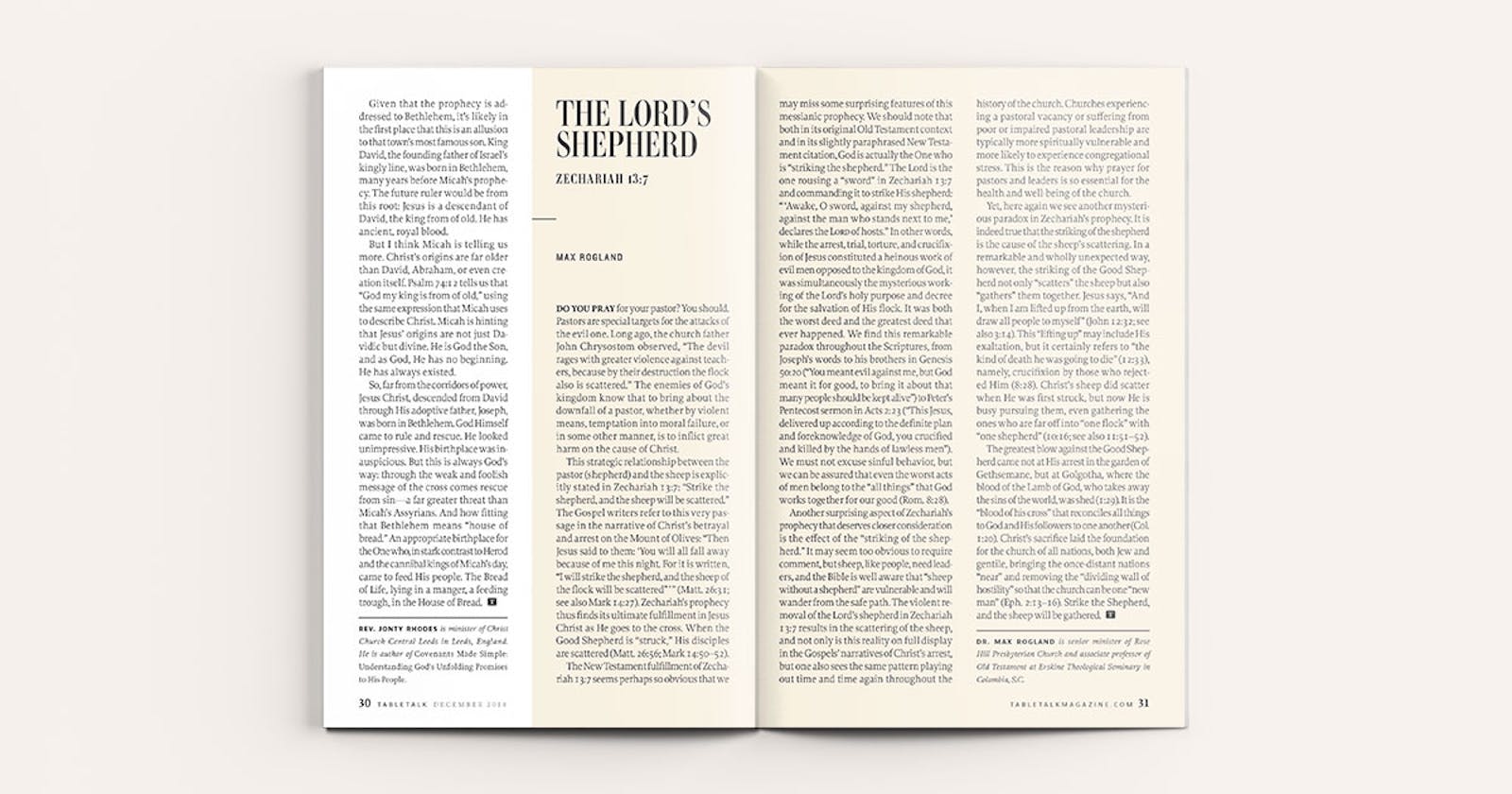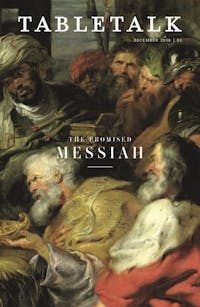
Request your free, three-month trial to Tabletalk magazine. You’ll receive the print issue monthly and gain immediate digital access to decades of archives. This trial is risk-free. No credit card required.
Try Tabletalk NowAlready receive Tabletalk magazine every month?
Verify your email address to gain unlimited access.
Do you pray for your pastor? You should. Pastors are special targets for the attacks of the evil one. Long ago, the church father John Chrysostom observed, “The devil rages with greater violence against teachers, because by their destruction the flock also is scattered.” The enemies of God’s kingdom know that to bring about the downfall of a pastor, whether by violent means, temptation into moral failure, or in some other manner, is to inflict great harm on the cause of Christ.
This strategic relationship between the pastor (shepherd) and the sheep is explicitly stated in Zechariah 13:7: “Strike the shepherd, and the sheep will be scattered.” The Gospel writers refer to this very passage in the narrative of Christ’s betrayal and arrest on the Mount of Olives: “Then Jesus said to them: ‘You will all fall away because of me this night. For it is written, “I will strike the shepherd, and the sheep of the flock will be scattered” ’ ” (Matt. 26:31; see also Mark 14:27). Zechariah’s prophecy thus finds its ultimate fulfillment in Jesus Christ as He goes to the cross. When the Good Shepherd is “struck,” His disciples are scattered (Matt. 26:56; Mark 14:50–52).
The New Testament fulfillment of Zechariah 13:7 seems perhaps so obvious that we may miss some surprising features of this messianic prophecy. We should note that both in its original Old Testament context and in its slightly paraphrased New Testament citation, God is actually the One who is “striking the shepherd.” The Lord is the one rousing a “sword” in Zechariah 13:7 and commanding it to strike His shepherd: “ ‘Awake, O sword, against my shepherd, against the man who stands next to me,’ declares the Lord of hosts.” In other words, while the arrest, trial, torture, and crucifixion of Jesus constituted a heinous work of evil men opposed to the kingdom of God, it was simultaneously the mysterious working of the Lord’s holy purpose and decree for the salvation of His flock. It was both the worst deed and the greatest deed that ever happened. We find this remarkable paradox throughout the Scriptures, from Joseph’s words to his brothers in Genesis 50:20 (“You meant evil against me, but God meant it for good, to bring it about that many people should be kept alive”) to Peter’s Pentecost sermon in Acts 2:23 (“This Jesus, delivered up according to the definite plan and foreknowledge of God, you crucified and killed by the hands of lawless men”). We must not excuse sinful behavior, but we can be assured that even the worst acts of men belong to the “all things” that God works together for our good (Rom. 8:28).
Another surprising aspect of Zechariah’s prophecy that deserves closer consideration is the effect of the “striking of the shepherd.” It may seem too obvious to require comment, but sheep, like people, need leaders, and the Bible is well aware that “sheep without a shepherd” are vulnerable and will wander from the safe path. The violent removal of the Lord’s shepherd in Zechariah 13:7 results in the scattering of the sheep, and not only is this reality on full display in the Gospels’ narratives of Christ’s arrest, but one also sees the same pattern playing out time and time again throughout the history of the church. Churches experiencing a pastoral vacancy or suffering from poor or impaired pastoral leadership are typically more spiritually vulnerable and more likely to experience congregational stress. This is the reason why prayer for pastors and leaders is so essential for the health and well-being of the church.

Yet, here again we see another mysterious paradox in Zechariah’s prophecy. It is indeed true that the striking of the shepherd is the cause of the sheep’s scattering. In a remarkable and wholly unexpected way, however, the striking of the Good Shepherd not only “scatters” the sheep but also “gathers” them together. Jesus says, “And I, when I am lifted up from the earth, will draw all people to myself” (John 12:32; see also 3:14). This “lifting up” may include His exaltation, but it certainly refers to “the kind of death he was going to die” (12:33), namely, crucifixion by those who rejected Him (8:28). Christ’s sheep did scatter when He was first struck, but now He is busy pursuing them, even gathering the ones who are far off into “one flock” with “one shepherd” (10:16; see also 11:51–52).
The greatest blow against the Good Shepherd came not at His arrest in the garden of Gethsemane, but at Golgotha, where the blood of the Lamb of God, who takes away the sins of the world, was shed (1:29). It is the “blood of his cross” that reconciles all things to God and His followers to one another (Col. 1:20). Christ’s sacrifice laid the foundation for the church of all nations, both Jew and gentile, bringing the once-distant nations “near” and removing the “dividing wall of hostility” so that the church can be one “new man” (Eph. 2:13–16). Strike the Shepherd, and the sheep will be gathered.
